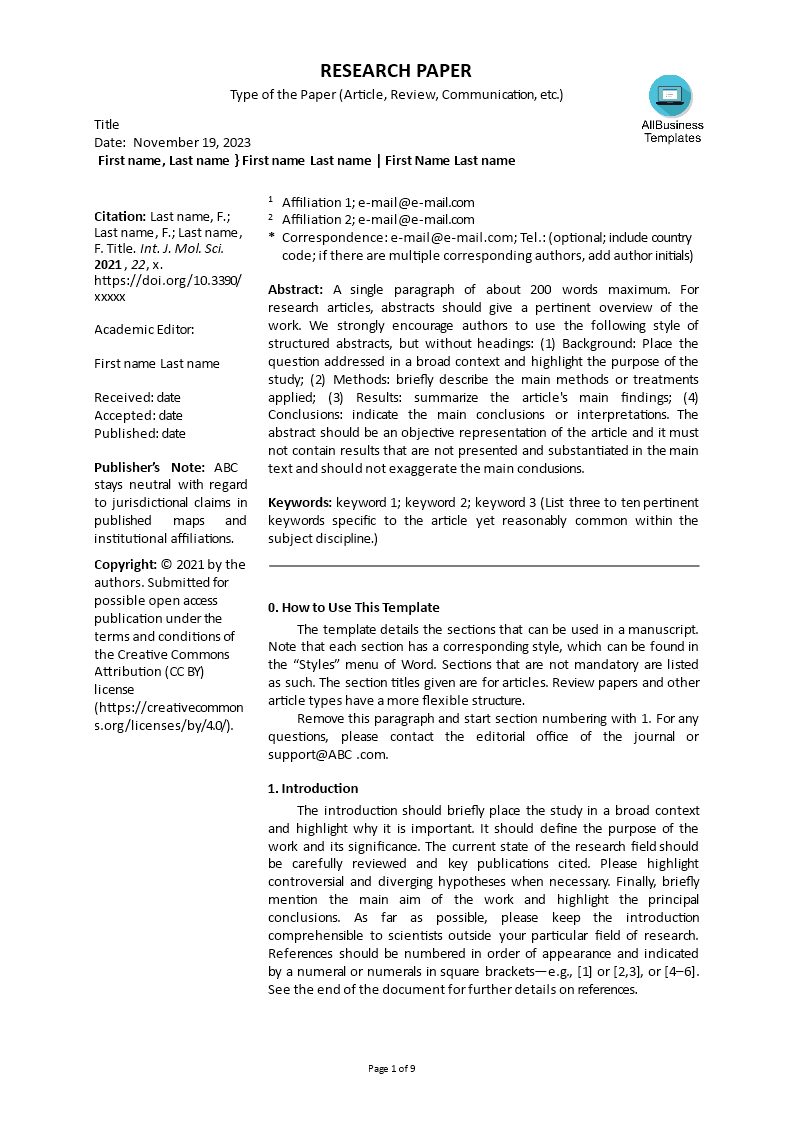Research Paper example
Sponsored Link免费模板 保存,填空,打印,三步搞定!

Download Research Paper example
微软的词 (.docx)免费文件转换
- 本文档已通过专业认证
- 100%可定制
- 这是一个数字下载 (62.19 kB)
- 语: English
Sponsored Link
How to write a research paper example? In search of a template for a research paper example? Look no further! We have a sample template that you can use to get started on your research paper. Our templates are tailored to the needs of your specific project and will help you create a well-structured and organized paper.
Writing a research paper involves several steps, and while the specific process may vary depending on the academic discipline and the requirements of the assignment or target journal, the following is a generalized example of how you might approach writing a research paper:
1. Choose a Topic:
- Select a research topic that interests you and aligns with the goals of your assignment or the focus of the journal you plan to submit to.
2. Conduct a Literature Review:
- Review existing literature related to your topic to understand what is already known and identify gaps or areas where further research is needed.
3. Formulate a Research Question or Hypothesis:
- Clearly define the research question your paper aims to answer or the hypothesis it seeks to test.
4. Develop a Research Plan:
- Outline your methodology, including the research design, participants, data collection methods, and analysis techniques.
5. Collect Data:
- Conduct your research and gather relevant data according to your research plan.
6. Organize Your Findings:
- Analyze your data and organize your findings. Use tables, charts, graphs, or other visual aids to present data effectively.
7. Write the Introduction:
- Introduce your research paper with background information on the topic, the significance of your study, and the research question or hypothesis.
8. Write the Literature Review:
- Summarize and discuss relevant literature, highlighting the gaps your research addresses.
9. Present Your Methodology:
- Describe your research design, participants, data collection methods, and analysis procedures in detail.
10. Present Your Results:
- Present your findings clearly, using a combination of text and visual aids.
11. Discuss Your Findings:
- Interpret your results, discuss their implications, and address any limitations of your study.
12. Write the Conclusion:
- Summarize your main findings and their significance. Restate your research question or hypothesis and suggest avenues for future research.
13. Write the Abstract:
- Summarize your entire paper in a concise abstract, including key objectives, methods, results, and conclusions.
14. Create Citations and References:
- Cite all the sources you used in your paper following the appropriate citation style.
15. Proofread and Edit:
- Carefully proofread your paper for grammatical errors, clarity, and coherence.
16. Format Your Paper:
- Ensure your paper follows the formatting guidelines specified by your instructor or the target journal.
17. Seek Feedback:
- Share your draft with peers, mentors, or instructors to receive feedback and improve the quality of your paper.
Remember that this is a general guide, and the specific requirements for a research paper can vary. Always check the guidelines provided by your instructor or the target publication for any specific formatting or content requirements.
This is an argumentative research paper, in which the writer presents and supports a thesis concerning a significant issue in a major field. The writer attempts to persuade the reading audience to accept his/her position or judgement on the controversial issue.
Research Paper Checklist:
Before submitting your paper, review these questions:
- Does your paper have a clearly stated thesis?
- Is your introduction interesting? Does it give a clear sense of what the paper is about?
- Do you refute counter arguments?
- Do you provide sufficient evidence (Anecdotes, Data & Facts , Statistics, Quotes from authority/expert testimony, Examples , Personal Experience, Case studies) to support your thesis?
- Is the body of your paper well organized and developed logically? Is it unified and coherent?
- Have you documented all the borrowed words, facts, and ideas you have used?
- Is your tone appropriate for the subject and the audience?
- Does your conclusion end the paper effectively?
Download this critical review of a research paper example now for your reference.
DISCLAIMER
Nothing on this site shall be considered legal advice and no attorney-client relationship is established.
发表评论。 如果您有任何问题或意见,请随时在下面发布
Sponsored Link

